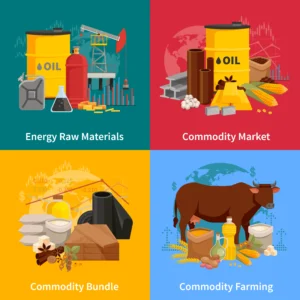In economics, a commodity is a basic good or raw material that is interchangeable with other goods of the same type. Commodities are essential in the production of goods and services and are traded in markets globally. They are usually standardized, meaning that a unit of a commodity is the same regardless of its producer.
Key Characteristics of Commodities:
✔ Interchangeability: One unit of a commodity is the same as another (e.g., one barrel of crude oil is identical to another).
✔ Global Demand: Commodities are essential for industries and daily life (e.g., food, energy, metals).
✔ Price Fluctuations: Prices are influenced by supply and demand, geopolitical events, and economic conditions.
Types of Commodities:
1. Hard Commodities (Extracted or mined from nature)
- Energy: Crude oil, natural gas, coal.
- Metals: Gold, silver, copper, platinum.
2. Soft Commodities (Grown or cultivated)
- Agricultural Products: Wheat, corn, coffee, sugar, cotton.
- Livestock: Cattle, hogs, poultry.
How Are Commodities Traded?

Commodities are traded in spot markets (immediate delivery) and futures markets (contract-based trades for future delivery). Major commodity exchanges include:
✔ Chicago Mercantile Exchange (CME)
✔ London Metal Exchange (LME)
✔ New York Mercantile Exchange (NYMEX)
Why Are Commodities Important?
- Economic Indicators: Rising commodity prices often indicate inflation.
- Investment & Hedging: Investors use commodities to hedge against inflation and diversify portfolios.
- Global Trade Impact: Commodities influence international trade and currency values.




